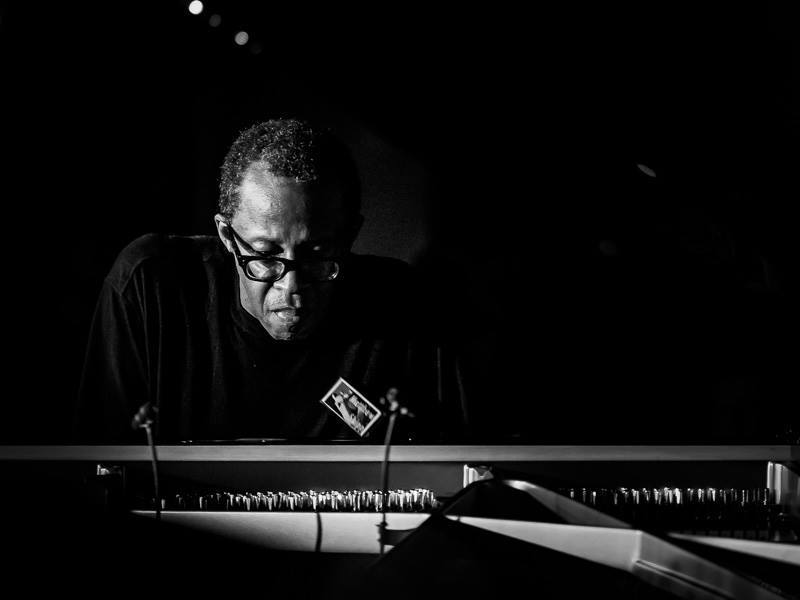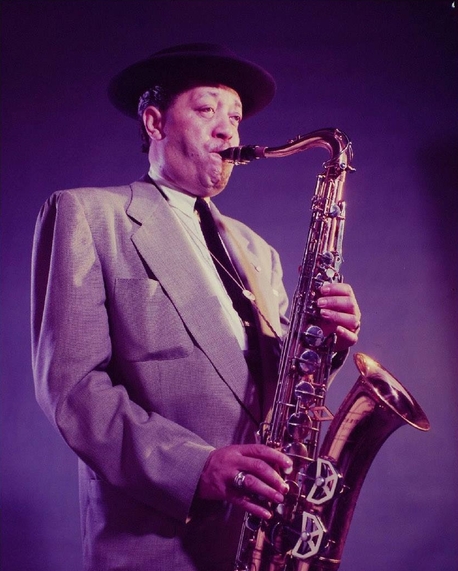John Butcher: In a way, you do that as a kid, when you come across a piano and just experiment with it.
Matthew Shipp: Sonny Rollins was asked how he developed. He said his mom bought him a saxophone and he would just go in the room and play. Anything. Just play. Basically he says it’s still what he does today. In the mean time, he learned the music rudiments and stuff, but he still basically goes in his room and just plays.
John Butcher: I think perhaps the jazz connection with some of the early improvisers and perhaps to some extent myself, is that idea of finding your own voice, which is a long-term thing, and learning by doing it. You don’t really learn it by theorizing too much, you learn by playing with other people, and that’s sort of independent of style or genre, it’s a kind of mental attitude. Your discoveries are made in the playing situation. When I started out a lot of sounds people found very unacceptable in improvisation, especially mine.
(laughter) Now there’s a very wide sonic palate that you can use. I like it when it comes naturally, through a player’s experience, in situations where they haven’t sat at home and studied ways of working with certain sounds or the books that talk about it, but it’s come about from the experience of playing. Wouldn’t you say like jazz in America is kind of being killed by the schools?
Matthew Shipp: Oh, I would definitely say that.
(laughter)
John Butcher: It’s not jazz any more.
Matthew Shipp: I don’t know what it is. I’ll tell you a story that encapsulates that. This is according to a friend of mine who was at a jazz festival (I was not there to verify it) —
Herbie Hancock and
Wayne Shorter were playing so he went to their sound check thinking it would be cool just to see them. So he walks up to the front and these two musicians are playing, but it’s not
Wayne and
Herbie (laughter). So they hire people like from Berklee School of Music that can play like them to do their soundchecks. It’s like…wow, man!
(laughter). That tells you there’s something wrong, instantly.
Since you mentioned early-on — certain sounds were unacceptable — have you ever actually had somebody come up to you after a gig?
John Butcher: I’ve had people come up to me like:
‘You shouldn’t be allowed to play like that’ In Germany'.
(laughter) I can remember it very clearly; in Cologne, in the nineties, playing somewhere. Somebody came up to me afterwards and got very angry.
Bogdan Scoromide: They reproach
Hans for the more electronic sounds at this festival, every year.
Matthew Shipp: I guess a free jazz audience wants to hear a really specific thing. So do you find that there’s a lot of clichés in free jazz?
(laughter)
John Butcher: Well, it depends what you mean by that and who’s doing it.
Matthew Shipp: Well, I’m not going there but, do you ever play in certain situations and it’s like: ‘here we go again’? So, you know there’s a set group of things you can not do in that setting?
John Butcher: I think my temperament is more... if I can hear it go that way, I probably would try and take it another way. You know, if it’s a very austere, minimalist improvising situation, I’m likely to get a bit steamy at points, and do the opposite in a free jazz thing. It’s kind of just not going with ‘the expected’. You don’t want to be just perverse, but the interest for me in improvisation is making that kind of music which you couldn’t really imagine before you find yourself in the middle of it.
Matthew Shipp: Right, right. That’s one of the best definitions I’ve ever heard of what artists like ourselves should be trying to do.
John Butcher: Because the worst thing is when someone comes with a fixed agenda of what they want to make happen in the piece. I suppose there’s about fifty people around the world I really like playing with, and get the chance to do it over a number years in different combinations. And it’s people who’ve got a strong personal language, but at the same time a great flexibility.
Matthew Shipp: Yeah. I feel there’s so few people in the world that I can really relate to their phrasing. First is the sound, then the phrasing. And there’s so few people who I can really relate to the elasticity. Because to me, there’s a very specific kind of thing that is new now, and certain jazz players phrase a certain way and you can tell they can never get past a certain thing, but you can’t just throw people together just because they play jazz or free jazz. I mean, there’s people that are kind of meant to play together. I’m not trying to sound cosmic, it’s just the elements of their personality allow it to happen, and to flow freely and freshly. There’s very few people in the world that I really feel myself, I enjoy playing with.








